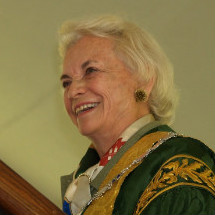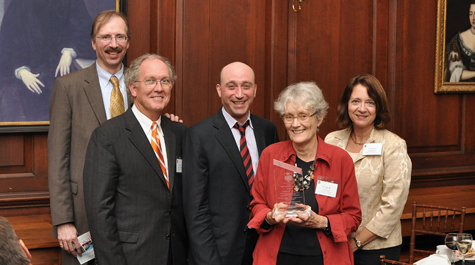"Joyful Property Professor" Carol M. Rose Honored with 2010 Brigham-Kanner Property Rights Prize, Justice Sandra Day O'Connor to Receive 2011 Prize at Beijing Conference
Rose joined an illustrious list of prior recipients that includes Professor Frank I. Michelman, Harvard Law School (2004), Professor Richard A. Epstein, University of Chicago Law School (2005), Professor James W. Ely, Jr., Vanderbilt Law School (2006), Professor Margaret Jane Radin, University of Michigan Law School (2007), Professor Robert C. Ellickson, Yale Law School (2008), and Professor Richard E. Pipes, Harvard University (2009).
Chancellor Professor of Law Lynda Butler, director of the William & Mary Property Rights Project, hailed Rose as "one of the greatest property law scholars and teachers of our generation." Professor Eric Kades, the project's first director and one of Rose's former students at Yale, presented the prize.
Kades told the audience that Rose's outsized reputation grew from her accomplishments as a scholar, teacher, and mentor. The audience laughed with appreciation when Kades produced a dog-eared copy of the syllabus that he had saved from Rose's property law class which he took at Yale in fall 1992.
As a scholar, Kades noted, Rose's work is richly imaginative, provocative, informed by an extraordinary range of knowledge, and never predictable. He cited three articles as illustrations. In "The Comedy of the Commons," Rose "added a whole new dimension" to a discussion of the commons that was "nuanced, not doctrinaire, and willing to entertain ... possibilities." In "Mahon Reconstructed," she drew on her background as a Ph.D. in history and looked at the tension in takings law that arose from the opposing forces of "individualism" and "civic republicanism" that existed at the time of the nation's founding. And, in "Property as Storytelling," Rose's knowledge of economics is evident as she challenges economic assumptions by proposing alternate characters to economics' "rational man" such as "the King of the Mountain" and "Portnoy's Mom."
"This is creative scholarship," Kades said. "It is thinking outside the box, [and is evidence of a scholar] not willing to go along with standard assumptions."
He spoke about the sense of discovery and wonder that Rose's writing evokes in readers: "When you read her scholarship, it is like going for a walk through spectacular terrain, with an extremely knowledgeable guide ... who is just irrepressibly enthusiastic. Her scholarship -- in a way that is very rare -- communicates excitement."
Kades contacted classmates to help him capture the impression Rose made on her students.
In the classroom, many recalled that Rose "was open and willing to entertain views from anywhere on the spectrum." And, she was fondly remembered as a professor who "would tease out a positive aspect" of a student's comment or question "in a most generous way."
She was, as well, someone "amazingly comfortable in her own skin," who was not invested in promoting her own views over those of other scholars.
Some eighteen years after taking that class, Kades could still recall some of the supplementary readings. In Rose's wide-ranging view, there were property lessons to be learned from a Chicago gang that became one of that city's biggest slum lords, from former President Nixon and his ill-fated quest to gain membership to co-ops in New York City, and from the oyster industry.
"[These readings] taught me so much about being an effective teacher -- that sort of vivid example that grabs you and drives home an important point," he recalled.
Former students remembered her as being in her element when she taught, that she truly relished the material and enjoyed the give-and-take with students that she fostered in the classroom.
"The really enduring image that I have from your class," Kades said, "is that someone would make a point -- something ironic, perhaps -- and you would just toss back your head and laugh. And that's why I remember Carol as a joyful property professor."
Justice O'Connor to Receive 2011 Prize at Beijing Conference
 Justice Sandra Day O'Connor will receive the 2011 Brigham-Kanner Property Rights Prize at the William & Mary Property Rights Project's eighth annual conference, which will be held in Beijing on Oct. 14-15, the Law School announced today. The 2011 conference will be co-sponsored by Tsinghua University School of Law and will be a featured event during the university's celebration of the 100th anniversary of its founding.
Justice Sandra Day O'Connor will receive the 2011 Brigham-Kanner Property Rights Prize at the William & Mary Property Rights Project's eighth annual conference, which will be held in Beijing on Oct. 14-15, the Law School announced today. The 2011 conference will be co-sponsored by Tsinghua University School of Law and will be a featured event during the university's celebration of the 100th anniversary of its founding."I am delighted that Justice O'Connor will allow us to recognize her contributions to property law jurisprudence and that she has agreed to travel to Beijing to receive the award and to attend the conference," said Law School Dean Davison M. Douglas. O'Connor's nomination in 1981 as the Supreme Court's first female justice, he said, ranked "among the momentous events in American history," and she was "one of the Court's most influential justices of the past half century."
O'Connor served as an associate justice of the Supreme Court from 1981 to 2006. She became Chancellor of the College of William & Mary following her retirement from the judiciary. In May 2010, the William & Mary Law School faculty awarded her its highest honor, the Marshall-Wythe Medallion, in recognition of her exceptional accomplishments and leadership.
Lynda Butler, Chancellor Professor of Law and Director of the William & Mary Property Rights Project, said she is looking forward to the Law School's first international conference and to the opportunity to exchange ideas with colleagues at Tsinghua University and other members of China's legal community. " In addition to Justice O'Connor, all seven of the previous recipients of the Brigham-Kanner Prize will join us in Beijing," Butler said. "Truly, this will be a historic gathering."
The faculty of Tsinghua University School of Law in Beijing comprises many of China's most noted scholars. Its distinguished graduates include Judges Tieya Wang and Ruao Mei, and Justice Duanmu Zheng of the Supreme People's Court.
For more information about the conference, contact the William & Mary Property Rights Project at (757)221-7466.
